with azbil
SPECIAL
Special Talk | Mari Amimoto, Women’s Wheelchair Basketball Player x Kiyohiro Yamamoto, Director, President, and CEO, Azbil Corporation
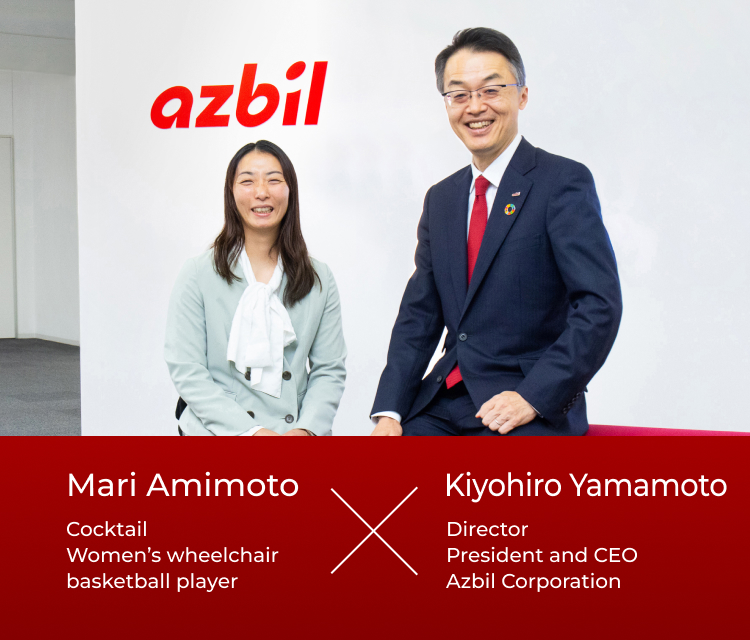
Persistently taking on new challenges is the path to Well-being
The concept of Well-being is attracting attention as an indicator of the richness of people’s lives and their mental and physical comfort and health. Mari Amimoto, a member of the women’s wheelchair basketball team Cocktail, and a player for Japan’s national team, continues to overcome various challenges and excel due to her unwavering determination, despite having a disability in her right leg. She spoke with Kiyohiro Yamamoto, the president and CEO of Azbil Corporation, which aims to realize well-being for both society and its employees, based on sustainable business growth.
Expanding the scope of activities not only in Japan but also overseas
Yamamoto I watched you and the other members of the Japanese team compete at the Paris 2024 Paralympic Games on TV. The matches against international athletes, who had physical advantages, were truly intense.
Amimoto During the Tokyo 2020 Paralympic Games, wheelchair basketball included a host country slot. The women’s competition featured teams from 10 countries, while the men’s competition included teams from 12 countries. On the other hand, at the Paris Games, both the women’s and men’s competitions were reduced to 8 countries each, resulting in tournaments featuring only the strongest teams. Amidst these conditions, our women’s wheelchair basketball team managed to win one game and finished in 7th place. In fact, our team was the only Japanese basketball team at the entire Paris Games to secure a win. The men’s wheelchair basketball team was unable to participate in the Paris Games. Although both the women’s basketball team, which won silver at the Tokyo 2020 Olympics, and the men’s basketball team made consecutive tournament appearances, they failed to secure a single win. As the only basketball team to secure a win, we felt a great sense of pride. We had always lost our final match at the Paralympics, but at the Paris Games, we were able to finish with a victory for the first time. This gives us confidence in our pursuit of a medal at the Los Angeles Paralympics in 2028.
Yamamoto I heard your performance at the Paris Games caught the attention of a French team and that you’ll be playing there starting January 2025. Did you have any doubts about moving to France alone?
Amimoto I have played for various overseas teams, starting with Australia, and followed by Germany and Spain. In each case, the teams reached out to me, but I believe that challenges come my way that only I can overcome. If I feel it’s an opportunity for growth, I don’t hesitate to say “yes” to the offer. I strongly believe that if I say “no” to an opportunity that comes my way, there’s no guarantee that the same chance will come around again. Of course, this is because I love basketball and always want to improve my skills.
Parasports in which able-bodied people can also participate
Yamamoto I first met you in 2023 at an event hosted by Shonan United BC, a Japanese professional basketball team sponsored by Azbil. What surprised me at that time was seeing you briskly walking off the court after the game. I always assumed that wheelchair basketball players use wheelchairs in their daily lives as well, but that’s not necessarily the case, is it?
Amimoto
Yes, that’s correct. Since July 2018, able-bodied individuals have also been able to register as wheelchair basketball players. Currently, they can participate in all wheelchair basketball games in Japan, including the Emperor’s Cup and Empress’s Cup, which determine the top club teams in the country.
Under the rules of wheelchair basketball, each player is assigned a score ranging from 1.0 to 4.5 points depending on the degree of their disability and their level of physical function. The more severe the disability, the lower the point value assigned; conversely, the less severe the disability, the higher the point value. For example, athletes with very mild disabilities or able-bodied players are assigned a point value of 4.5. The total point value of the five players on the court must not exceed 14 points. This requires teams to strategically combine players with varying degrees of impairment, rather than relying solely on those with milder disabilities. This rule also ensures that both players with more severe disabilities and those with milder disabilities have an equal opportunity to participate in games.
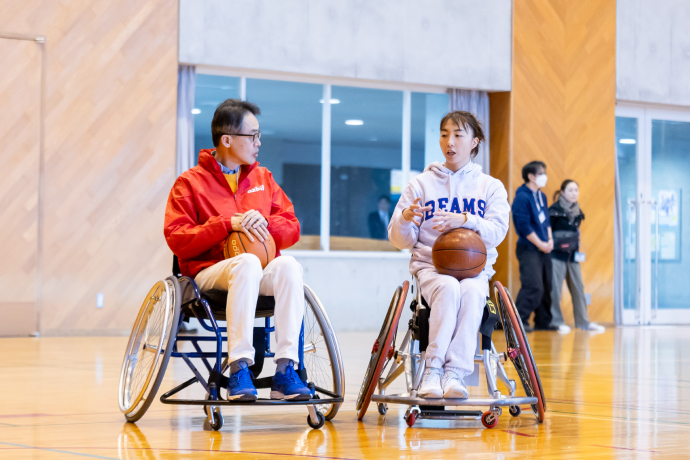
In February 2024, President Yamamoto experienced using a sports wheelchair for the first time at a Shonan United BC event
Overcoming the disability in her right leg through repeated challenges
Yamamoto Why did you become involved in wheelchair basketball?
Amimoto
I was born with a condition called clubfoot, where the bone in my right ankle was deformed inward. However, I had surgery when I was 10 months old and am now able to walk without any problems in my daily life. At that time, my parents wanted me to live like any able-bodied person and allowed me to do whatever I wanted. When I was 2 years old, I started artistic gymnastics at a club that has produced Olympic athletes, and later, after being invited by a friend, I started playing mini basketball in the third grade. That was the start of my basketball journey. I was so absorbed in basketball that I would practice after school on days when I had classes, and from 9am to 9pm on weekends when I didn’t have classes.
In my second year of middle school, I was the team captain and was also selected for the regional all-star team. However, in the summer of that same year, I had to undergo surgery again to cut the bone in my right leg, which was scheduled to be done once my body had grown to a certain extent. About two months after the surgery, the cast was removed, but the doctor prohibited me from putting my right foot on the ground. As a result, I had to use crutches for about six months. During my final game in my third year of middle school, I was allowed to play for just two minutes, but I was in no condition to run at full speed.
Yamamoto Is that when you started exploring the path of becoming a wheelchair basketball player?
Amimoto Yes, that’s correct. I first watched wheelchair basketball when I was in the fifth grade, together with my mother, at the Osaka City Nagai Sports Center for Persons with Disabilities. Of course, at that time, I was playing mini basketball on my own feet, so I wasn’t particularly interested in it. However, after that final match in my third year of middle school, I realized it would be difficult to continue playing as I had been, so in my first year of high school, I expressed interest in participating in an Australian wheelchair basketball camp that was being advertised, and I was given the opportunity to go. As I played with players my own age from Australia and the United States, wheelchair basketball became increasingly fascinating. An interpreter encouraged me by saying that, "If you become part of the Japanese national team, you’ll be able to play with people from even more countries." This led me to decide to pursue wheelchair basketball seriously. After returning to Japan, I joined my current team, Cocktail. It just happened to be a time of transition for the Japanese national team, and fortunately for me, I was selected for a development program for future representatives of Japan at the age of 16.
Yamamoto Since then, in addition to continuing as a representative of Japan, you’ve also played and excelled with other teams, such as the men’s team Itami Super Phoenix, as well as the teams you mentioned earlier in Australia, Germany, and Spain. In that sense, it can be said that you have continually forged your own path by always thinking about what you want to do and how you can achieve it, and then putting those plans into action.
Amimoto However, once, after returning home from the Paralympics in Paris, I was overwhelmed by a feeling I’d never experienced before, similar to burnout syndrome. Specifically, while I still loved basketball and wanted to play, my body just couldn’t keep up. It felt as though my mind and body had become disconnected. I felt that if I continued practicing any further, I might have a mental breakdown. So, I made the deliberate decision to take a break, and for about a month and a half after the Paris Games, I didn’t practice at all. I felt that to continue as a member of a development program for future representatives of Japan and make further progress toward the 2028 Los Angeles Games, I needed to take some time off to rest. Then, as the Empress’s Cup approached in December, I gradually began to resume practice. As a result, practice started to feel enjoyable again, and I felt as if I had finally reconnected with my old self. This led to our achieving a historic ninth consecutive victory in the Empress’s Cup. I realized firsthand the importance of having both a healthy mind and a healthy body.
Yamamoto What you’re saying is an important message for modern society. Many unexpected events have been occurring, and society has been in a constant state of tension. In such circumstances, thinking about mental and physical comfort and health, commonly referred to as Well-being, is important and can offer insights into solving various problems.
Aiming to achieve Well-being based on sustainable business growth
Amimoto Speaking of Well-being, I’ve heard that it has recently become a very important keyword at Azbil as well.
Yamamoto Well-being is defined by the World Health Organization (WHO) as “a state of complete satisfaction and sustainable happiness,” and it generally refers to a state of “happiness plus health.” In the azbil Group, the Guiding Principles for azbil Group Business state: “Building long-term partnerships with stakeholders: Based on the happiness of people working in the azbil Group, we continually pursue the happiness of customers at their sites, and share in their sense of accomplishment.” We aim to achieve Well-being based on sustainable business growth. Based on these action guidelines, we aim to create an environment where many employees, from young staff to mid-career and veteran employees, can take on a wide range of challenges and engage in their work with a sense of purpose. We are actively promoting various initiatives to achieve this.
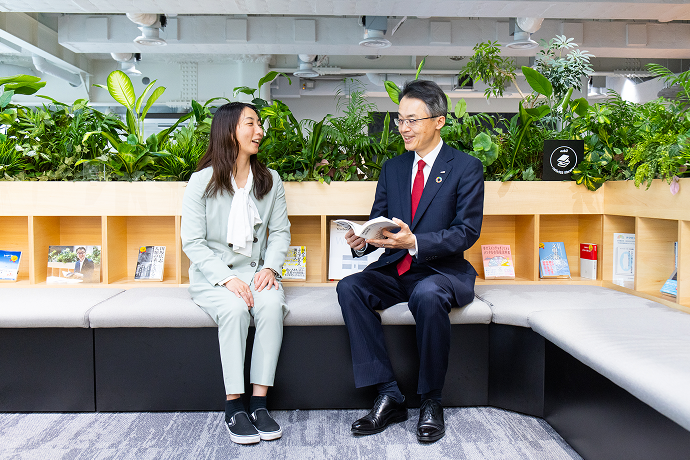
At the library within the Fujisawa Technology Center, which was established based on employees’ ideas
Amimoto It seems that these initiatives are effective, as your company’s employees appear to be very cheerful and considerate. They show a lot of empathy, both towards the company and outside parties such as customers.
Yamamoto
Thank you. For me personally, the keywords that I value are action and experience. Specifically, we communicate to our employees that it is important to take concrete actions in their daily work and to leverage the experiences gained from those actions in future tasks. Additionally, we are working to create a system that actively accepts suggestions from employees regarding various initiatives currently being implemented within the company, such as achieving carbon neutrality.
The Osaka-Kansai Expo, which will be held starting April 13, 2025, has adopted the theme “Designing Future Society for Our Lives.”The azbil Group sees its sponsorship of the Theme Weeks as a fantastic opportunity to introduce the future we envision to people around the world. As a platform for promoting Well-being, we particularly want to incorporate the opinions of our younger employees. Currently, a team primarily composed of young members is diligently preparing for this.
The decline in the number of players and teams is a challenge for the future
Yamamoto Looking to the future, are there any challenges you currently see in wheelchair basketball or parasports as a whole?
Amimoto
Speaking of wheelchair basketball, especially for women, I think the declining number of players and the aging population are very pressing issues. When I started playing about 20 years ago, I remember there being at least 100 registered female players. In the Empress’s Cup, which is the women’s championship, there were times when as many as 8 to 9 teams participated. Now, however, the number of registered players is around 70, and only 6 teams participate in it. Some teams participate jointly, while others are unfortunately forced to suspend their participation. In the case of women, it is not rare for them to retire from competition after getting married and having children, without ever returning to the sport. When the number of participants in a sport decreases, it becomes difficult for teams and athletes to improve by challenging and pushing each other.
To address these issues, I believe it is important to broaden the base of participation in the sport. I believe that wheelchair basketball, in particular, is one of the most accessible sports to participate in, so incorporating it into activities like corporate training or recreation could be an effective strategy. I believe that for companies, team competitions will also contribute to fostering better communication and teamwork.
Yamamoto Azbil has contributed to fostering a sports culture with a community-based approach by sponsoring professional teams such as the soccer club Shonan Bellmare and the basketball team Shonan United BC. Additionally, from the perspective of employing individuals with disabilities, we have established Azbil Yamatake Friendly Co., Ltd., a special subsidiary, and have been operating it for over 25 years. We are also considering various ways in which we can support the development of parasports.
Amimoto We would greatly appreciate your support. I’m looking forward to it.
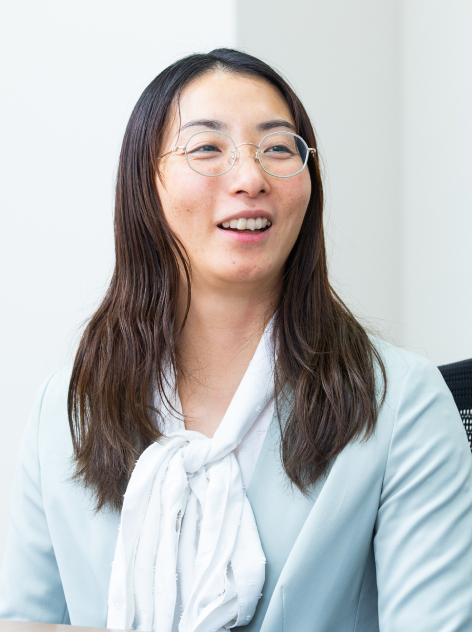
It is important to have both a healthy mind and a healthy body
Taking a break is also necessary for making the next leap forward
Mari Amimoto
Cocktail
Women’s wheelchair basketball player
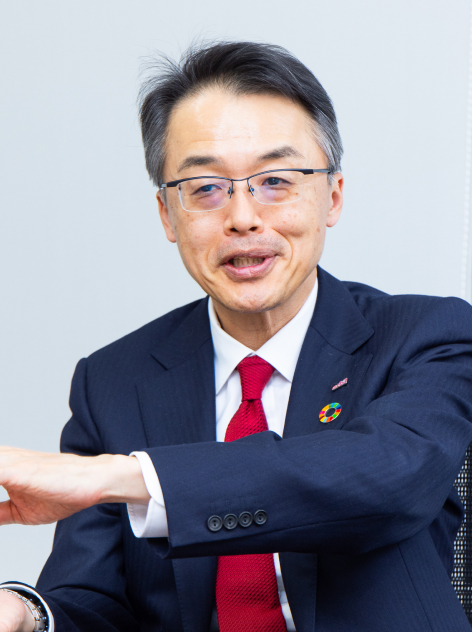
Aiming for the Well-being of society and our employees based on sustainable business growth
Kiyohiro Yamamoto
Director
President and CEO
Azbil Corporation
- *This article was translated from the Japanese version of the article published on April 15, 2025.

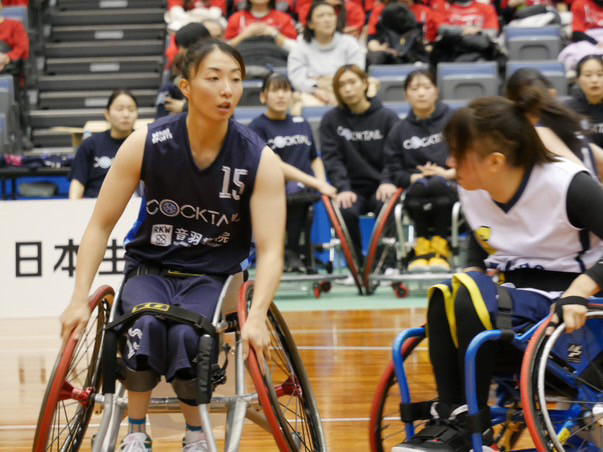
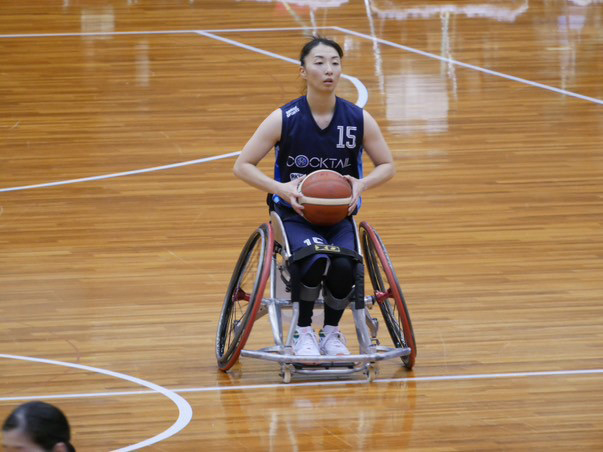
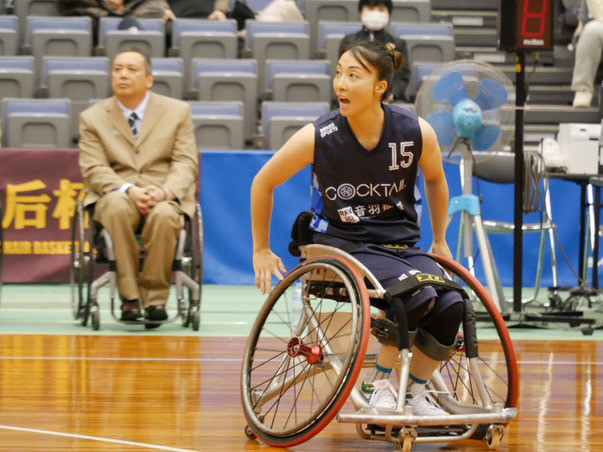
 Related information
Related information

